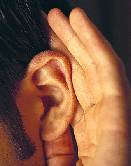
TUESDAY, July 27 (HealthDay News) — People with a foreign accent are perceived as less truthful by listeners because an accent makes a person harder to understand, a new study contends.
American researchers asked study participants to judge the truthfulness of trivia statements — such as, “A giraffe can go without water longer than a camel can” — by native and non-native speakers of English.
Even though they knew the speakers were reading from script, the participants judged people with foreign accents to be less truthful. And, the heavier the accent, the lower the score. On a truthfulness scale created for the study, native English speakers scored 7.5, people with mild accents scored 6.95, and people with heavy accents scored 6.84.
“The accent makes it harder for people to understand what the non-native speaker is saying. They misattribute the difficulty of understanding the speech to the truthfulness of the statements,” Boaz Keysar, a professor of psychology and an expert on communication at the University of Chicago, said in a university news release.
The study appears in the current issue of the Journal of Experimental Social Psychology.
“The results have important implications for how people perceive non-native speakers of a language, particularly as mobility increases in the modern world, leading millions of people to be non-native speakers of the language they use daily,” Keysar said.
For example, an accent may affect the credibility of non-native job seekers, eyewitnesses, reporters, or people taking calls in foreign call centers, the study suggested.
More information
To learn more about speech and potential speech disorders, visit the Nemours Foundation.

